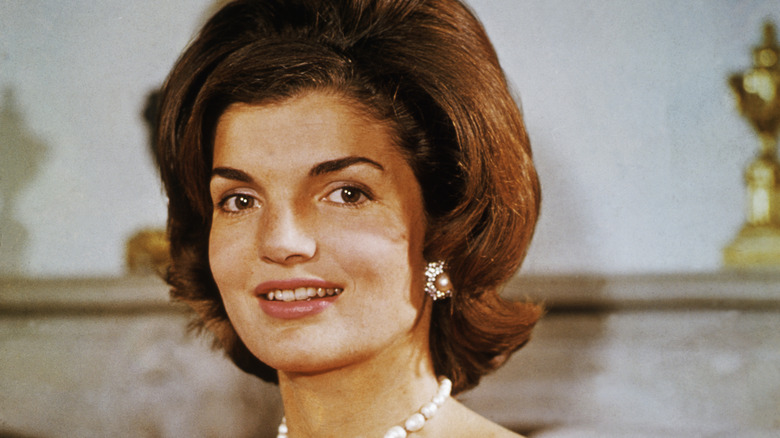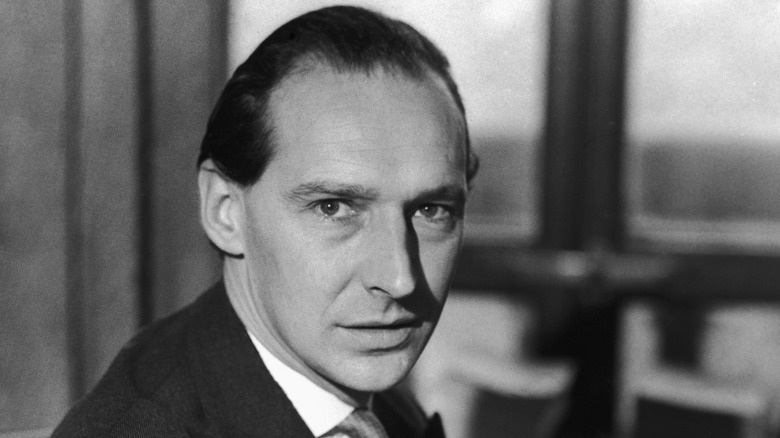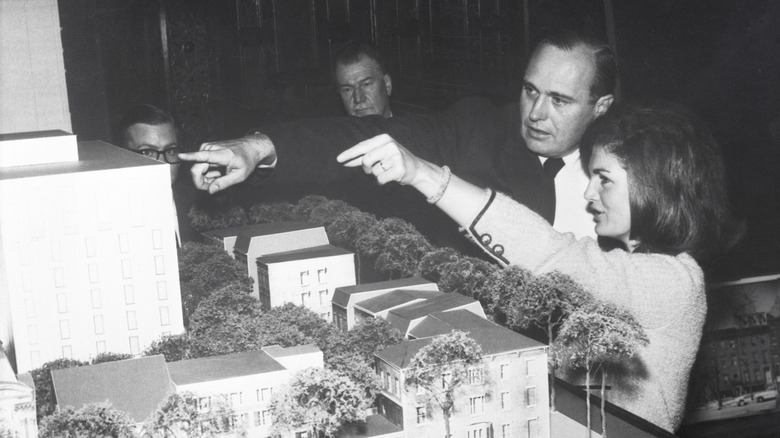The Unexpected Person Jackie Kennedy Rejected A Proposal From After JFK's Death
On November 22, 1963, John F. Kennedy was assassinated in Dallas, Texas while his wife, Jacqueline Kennedy Onassis, sat beside him. Jackie was never the same after JFK's death, and she struggled with bereavement as a public figure. "Most people think having the world share in your grief lessens your burden," the then-first lady told Life magazine at the time, per Slate. "It magnifies it."
One person who shared in Jackie's grief was David Ormsby-Gore, aka Lord Harlech. Ormsby-Gore and JFK became close friends when Joe Kennedy, JFK's father, worked as U.S. ambassador to the U.K. from 1938 to 1940. Then, from 1961 to 1965, Ormsby-Gore was a diplomat serving as British ambassador to the U.S. Their close relationship expanded to include Jackie and Sissie, Ormsby-Gore's wife. As evidence of their closeness, "Sissie is told by Jackie, the day after the assassination, that, had [their son] Patrick Kennedy lived, she would have been his godmother," Gary Ginsberg, author of "First Friends," informed People.
Tragically, Sissie died in a car accident in May 1967, and Ormsby-Gore felt even closer to Jackie since they were both widowed. Six months later, Jackie and Ormsby-Gore went to Cambodia, a trip that ignited rumors of wedding bells. The rumors were justified, and sometime later, Ormsby-Gore asked Jackie to marry him as resurfaced letters revealed. He was devastated when she turned him down. "As for your photograph, I weep when I look at it. Why do such agonizing things have to happen?" the former ambassador wrote in a reportedly unsent letter, per the BBC.
David Ormsby-Gore was firmly in Jackie's friend zone
By November 1968, after Jacqueline Kennedy Onassis had married Aristotle Onassis, she wrote to David Ormsby-Gore and explained why she couldn't marry him: "You are like my beloved, beloved brother — and mentor — and the only original spirit I know — as you were to Jack," (via The New York Times). Jackie had already considered her position on not marrying close acquaintances. She confided her thoughts about future marriages to Rev. Richard T. McSorley in 1964. "I don't want to live with someone of these old men friends some ten or fifteen years from now," McSorley quoted Jackie in his diary, per The Washington Post. "It'll be so lonely when the children go away to school."
In addition, Jackie also believed that she and Ormsby-Gore had too much of a commingled past. "You and I have shared so many lives and deaths and hopes and pain — we will share them forever and be forever bound together by them," she continued in a letter, per NBC News. "If ever I can find some healing and some comfort it has to be with someone who is not part of all my world and past and pain."
Lord Harlech kept Jackie's letters tucked away in red diplomatic boxes, where they remained decades past his death in 1985. While Jackie seemed confident in her choice of husband, closer to her own death in 1994, it's alleged that she second-guessed her decision not to marry Ormsby-Gore.
David Ormsby-Gore wasn't the only suitor Jackie rejected
Former ambassador David Ormsby-Gore wasn't the only person to feel the sting of Jackie Kennedy Onassis' rejection. The former first lady also had a serious relationship with architect Jack Warnecke. Jackie initially made his acquaintance in 1962 and then commissioned Warnecke to create John F. Kennedy's memorial after his 1963 assassination. By May 1964, Warnecke made the first move and coaxed Jackie into a date. Love blossomed for the pair and they vacationed in Hawaii in 1966, where Warnecke reportedly planned to propose to her.
However, author J. Randy Taraborrelli is skeptical they would have lasted as a couple. "I don't think it was as serious for her as it was for him," he informed People. Warnecke also disclosed a $650,000 debt, an admission that poured cold water on the romance. "She wasn't looking to be in a relationship with someone who was in debt," Taraborrelli explained. "That's how she ended up with Aristotle Onassis." Jackie provided additional reasons for marrying Onassis in a 1968 letter to Ormsby-Gore.
She noted that her new husband was "lonely and wants to protect me from being lonely. And he is wise and kind" (via The New York Times). After their romance ended, Warnecke kept in touch with Jackie by sending her an annual Valentine's Day card. They got together one final time two months before Jackie died. After reminiscing about some of Warnecke's old love letters, which Jackie had saved, she burned them.


